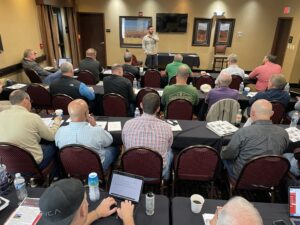
MONTGOMERY, Ala (BP)–An appeals court panel heard arguments over Judge Roy Moore’s “Ten Commandments” case June 4, with two of the three judges expressing skepticism that Moore’s arguments can pass constitutional hurdles. The third judge did not speak.
The case involves a 5,000-pound granite monument of the Ten Commandments that the Alabama Supreme Court chief justice placed in the Alabama Judicial Building’s lobby in 2001. Three lawyers who often visit the building sued to have the monument removed, contending it violated the First Amendment.
A federal judge ordered it removed, although that ruling has been stayed while the 11th Circuit Court of Appeals considers the case.
One of the three judges, Ed Carnes, said during oral arguments June 5 that siding with Moore would have enormous consequences, The Birmingham News reported.
“Its implications are staggering,” he told Moore’s attorney, Herb Titus.
For instance, Carnes said, Moore could decorate the building with paintings of Christ and even display a “What Would Jesus Do?” plaque, the newspaper reported.
Chief Judge J.L. Edmondson seemed more sympathetic to Titus’ arguments but told him that he faced “very tough” hurdles, The Atlanta Journal-Constitution reported.
One of those hurdles is the so-called three-pronged “Lemon Test,” which is named after the U.S. Supreme Court decision in the 1971 Lemon vs. Kurtzman case. According to the test, a state action must have a secular purpose, must not endorse religion and must not excessively entangle religion and government.
Edmondson said he has problems with the Lemon Test but believes the court must use it, The Birmingham News said.
Titus argued that the case meets the Lemon criteria, saying the Ten Commandments monument is “part of” an “unbroken history” of references to God in U.S. history and law, The Journal-Constitution reported.
Carnes was appointed by the first President Bush, Edmondson by President Reagan. Judge Richard Story, who did not ask questions, was appointed by President Clinton.
A ruling is expected this year, possibly within weeks. Both sides expect the loser to appeal to the U.S. Supreme Court.
In May, the 11th Circuit ruled in favor of a Georgia court displaying a seal with a symbol of the Ten Commandments. However, that symbol did not have the text of the Ten Commandments, the Atlanta newspaper noted.
–30–















